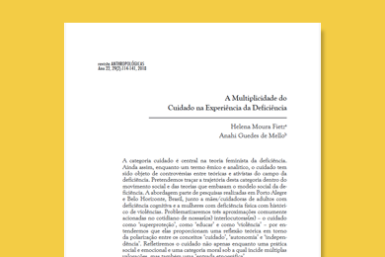
The category of “care” is a fundamental one in feminist disability studies. Still, as both an emic and an analytical term, “care” has been part of controversies in theoretical and activist works in the field of disability studies. In this paper, we aim to present the history of this category in the social movements and theories that form the basis of a social model of disability, in order to point out the conflicts that occur in this discussion. The starting point of the approach is our research conducted in the Brazilian cities of Porto Alegre and Belo Horizonte with mothers/caregivers of adults with cognitive disabilities and women with disabilities and a history of violence, as well as secondary sources. We question four approaches often connected to the daily life of these interlocutors — care as “overprotection”, care as “education”, and care as “violence” —, since we understand that they propose a theoretical reflection around the polarization of the concepts of “care”, “autonomy”, and “independence”. From the feminist theories of care, especially the work of the philosopher Eva Feder Kittay, we discuss care as not only a social and emotional practice and a moral category, but also an “ethnographic starting point” to ponder the ways in which disability is co-produced in the daily lives of our interlocutors, allowing for a better understanding of the experience of disability itself.